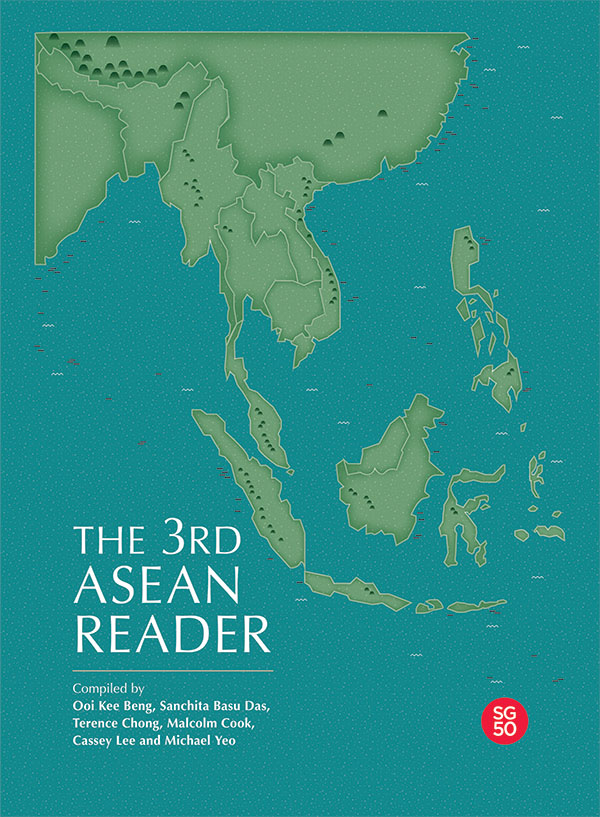Book contents
- Frontmatter
- Contents
- Preface
- Forewords to the First and Second ASEAN Reader: ASEAN: Conception and Evolution
- Forewords to the First and Second ASEAN Reader: ASEAN: The Way Ahead
- Forewords to the First and Second ASEAN Reader: New Challenges for ASEAN
- SECTION I ASEAN: THE LONG VIEW
- SECTION II COUNTRY ANALYSES
- SECTION III COMPARATIVE ANALYSES OF THE REGION
- Southeast Asian Societies
- The Southeast Asian Economy
- Southeast Asian Politics
- SECTION IV INTERNATIONAL DEVELOPMENTS
- SECTION V INSTITUTIONS OF ASEAN
- SECTION VI ASSESSING ASEAN'S INTERNAL POLICIES
- ASEAN Political Security Community
- ASEAN Economic Community
- ASEAN Socio-Cultural Community
- SECTION VII ASSESSING ASEAN'S EXTERNAL INITIATIVES
- ASEAN Processes
- ASEAN's Major Power Relations
- SECTION VIII SOUTHEAST ASIA: PERIPHERAL NO MORE
- Bibliography
- The Contributors
- The Compilers
Forewords to the First and Second ASEAN Reader: New Challenges for ASEAN
Published online by Cambridge University Press: 22 June 2017
- Frontmatter
- Contents
- Preface
- Forewords to the First and Second ASEAN Reader: ASEAN: Conception and Evolution
- Forewords to the First and Second ASEAN Reader: ASEAN: The Way Ahead
- Forewords to the First and Second ASEAN Reader: New Challenges for ASEAN
- SECTION I ASEAN: THE LONG VIEW
- SECTION II COUNTRY ANALYSES
- SECTION III COMPARATIVE ANALYSES OF THE REGION
- Southeast Asian Societies
- The Southeast Asian Economy
- Southeast Asian Politics
- SECTION IV INTERNATIONAL DEVELOPMENTS
- SECTION V INSTITUTIONS OF ASEAN
- SECTION VI ASSESSING ASEAN'S INTERNAL POLICIES
- ASEAN Political Security Community
- ASEAN Economic Community
- ASEAN Socio-Cultural Community
- SECTION VII ASSESSING ASEAN'S EXTERNAL INITIATIVES
- ASEAN Processes
- ASEAN's Major Power Relations
- SECTION VIII SOUTHEAST ASIA: PERIPHERAL NO MORE
- Bibliography
- The Contributors
- The Compilers
Summary
No one in the 1950s expected that anti-colonialism in Southeast Asia would give way to anti-communism and that this would be followed less than 40 years later by the triumph of capitalism. That last triumph did not mean that there would be greater certainty in the region. ASEAN has had to adjust to a world dominated by a single superpower. Since September 11, 2001, this dominance is starker still and all countries face a newly aroused United States of America. ASEAN will have to see if it now has more choice to pick its own script or will be told what new role it has to play. There are signs, however, that a series of changes may have stirred ASEAN to new life.
After 35 years, this is a more mature ASEAN, whose member states have survived experiments with different regional organizations and have had their wits sharpened considerably by that experience. They now know better how small and medium-sized states can survive and how they must generate innovative thinking if they want to prosper. Since the financial crisis of 1997, they have been given additional lessons about the effects of globalization and become sensitive to the pressures from non-state actors and other transnational groups. The essays selected in this volume tell us how ASEAN has adapted to the radical and unpredictable changes that have dogged the organization since its foundation and how it might deal with uncertainties in the future.
The victory of liberal capitalism in a globalized market economy requires that all Southeast Asian states be alert to America's policies in the region if they want to maximize the benefits to themselves. It is, of course, not enough to do that. They must continue to look to the economic might of Japan whose commitments in Southeast Asia from before the foundation of ASEAN have been of major importance to the region's development. It is obviously in ASEAN's interest to ensure that Japan remains committed. In addition, a nuclear South Asia and the awakening of India's high-tech entrepreneurship has great potential for the region's security as well as the future growth of the ASEAN economies. Nevertheless, given America's fresh interest in Asia, China's role requires close attention.
- Type
- Chapter
- Information
- The 3rd ASEAN Reader , pp. xxiv - xxviPublisher: ISEAS–Yusof Ishak InstitutePrint publication year: 2015



